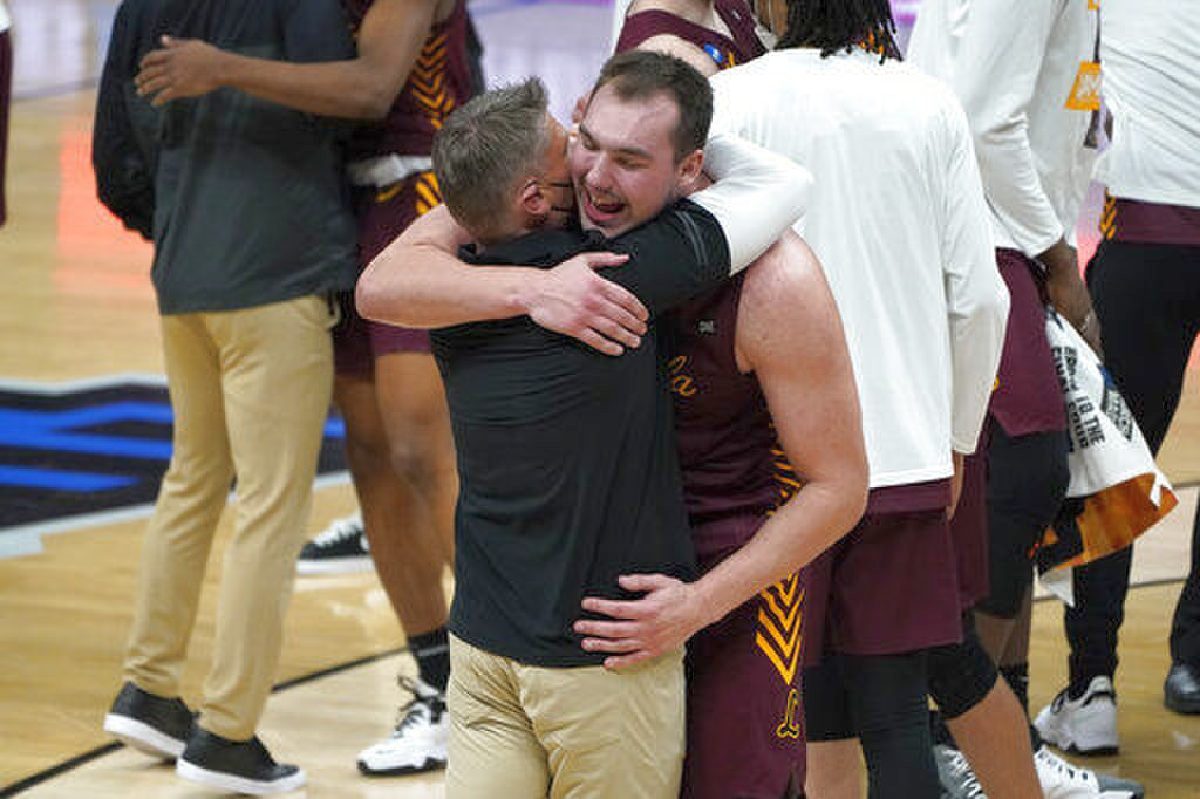
College basketball and the United States of America were in different places in 1963 than they are now, although the eruptions in the streets related to the Black Lives Matter movement of 2020 would suggest the gap is smaller than good citizens might think.
One thing in common connecting the two eras is Loyola of Chicago basketball. While this is the second time since 2018 the Ramblers and cherubic marvel Sister Jean have made the nation swoon, the real pride of the program dates back 58 years.
While 101-year-old Sister Jean, wrapped in her Loyola-colors scarf, her face partially obscured by a social distancing face mask, makes for appealing camera shots when the Ramblers take over an NCAA basketball tournament TV screen, viewers might not have absorbed the significance of a different shot during Loyola’s 71-58 victory over Illinois on Sunday.

The camera alighted on Jerry Harkness seated in the stands at the Midwest Regional. The Jerry Harkness who played for the Indiana Pacers so many years ago, the Jerry Harkness who was captain and All-American for the 1963 national champion Ramblers.
Yes, the NCAA champion Ramblers.
Illinois, a No. 1 seed and a top-three ranked team this season, has been more publicized recently, but Loyola is the only school from that state to win an NCAA crown.
Illinois was favored, but Loyola didn’t care.
“They listen, they lock in, they defend,” said Loyola coach Porter Moser of his players.
Listen to him. Listen to their hearts. Do not listen to what Moser called outside noise.
This is already a great run, the Missouri Valley champs sitting at 27-4 and poised to take on Oregon State in the Sweet Sixteen later this week. Just as 2018 was a joyride to the Final Four when no one thought the Ramblers could do it.
There are two seniors on this Loyola team who were freshmen on the 2018 NCAA team, Cameron Krutwig and Lucas Williamson. Williamson scored 21 points in the 71-60 victory over Georgia Tech. Krutwig accumulated 19 points, 12 rebounds and five assists versus the Illini.
Although Krutwig did not rub it in, this game meant something in Chicago where the Downstate Illini state school often rules in recruiting.
“To be the best, you’ve got to beat the best,” Krutwig said. “It’s just a special moment.”
COVID-19 has made this season a weird one, a roller-coaster, Krutwig said, wondering if there was going to be a season, wondering if the Ramblers would stay healthy. Like a big kid, he called this win “specialer” compared to 2018.
“That Final Four holds a special place in my heart,” Krutwig said. “Specialer (now) because I’m in the moment.”
The wonder of sharing such satisfaction with teammates on the court — Moser told his guys not to run to the locker room, but soak in the postgame scene together — is very much an in-the-moment emotional circumstance.
Sometimes, those NCAA snapshots last forever, and nothing has quite stuck to the school the way the 1963 run did. That year, the Ramblers were no worse than co-favorites.
Yet they were very much history makers, pioneers before their time. Loyola under coach George Ireland started four Black players regularly and in December 1962 became the first NCAA team to play five Blacks on the court at once against Wyoming.
This was a time of appalling race in sensitivity. Ireland was hung in effigy. Players received mailed death threats, which the coach hid in a drawer. In Houston, fans shouted racial epithets. In New Orleans, the squad’s Blacks and whites were forced to stay in separate accommodations. A mixed group of Black and white teammates had trouble ordering postgame hamburgers at a diner in Huntington, West Virginia.
“There was a lot of pressure,” Ron Miller, one starter, said.
The NCAAs of 1963 brought its own drama. In a rare year Kentucky did not win the Southeastern Conference, Mississippi State was on a roll. But the state enforced racist rules prohibiting athletic contests against teams with Black players.
The Bulldogs turned down NCAA invitations. There was a new administration that school year, though, and coach Babe McCarthy told his all-white team if it qualified, he would make sure it got to the NCAAs.
Mississippi State drew Loyola in East Lansing, Michigan, segregationists lobbied for the team to stay home, McCarthy took himself to Memphis, Tennessee, where he could duck any state court order. He also arranged for players to be spirited out of Starkville. Then he watched president Dean W. Colvard cleverly avoid receipt of an injunction.
The game was played without incident, Loyola winning by 10 points. Decades later, the schools commemorated what had been a milestone moment in basketball-race relations.
When Loyola won it all in 1963, there was dancing in the street in Chicago, a celebration of perseverance, as well as triumph in sport. During a time of change and a time of turbulence in the civil rights movement, Harkness later said he and his teammates, so many of whom have passed away, stood up for something.
Those who appreciate Loyola of 2018 and 2021 should open their hearts to Loyola of 1963, too.
